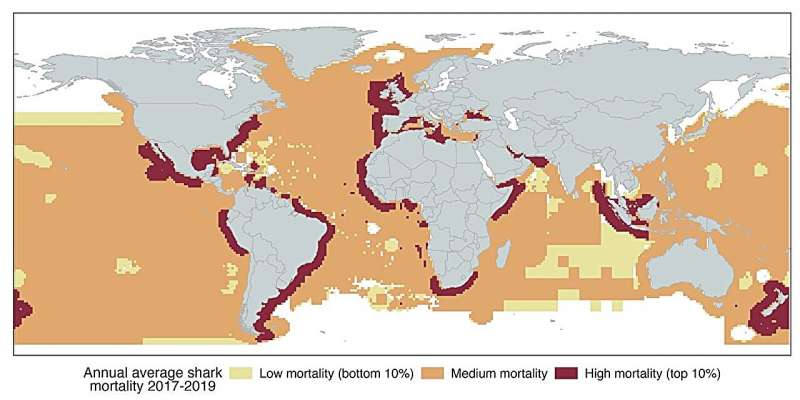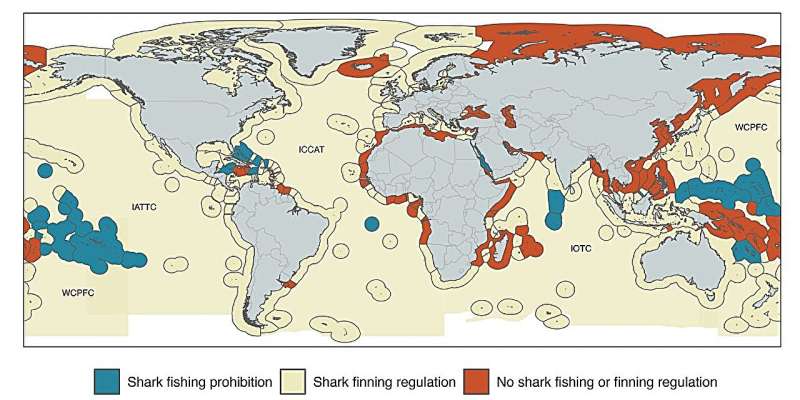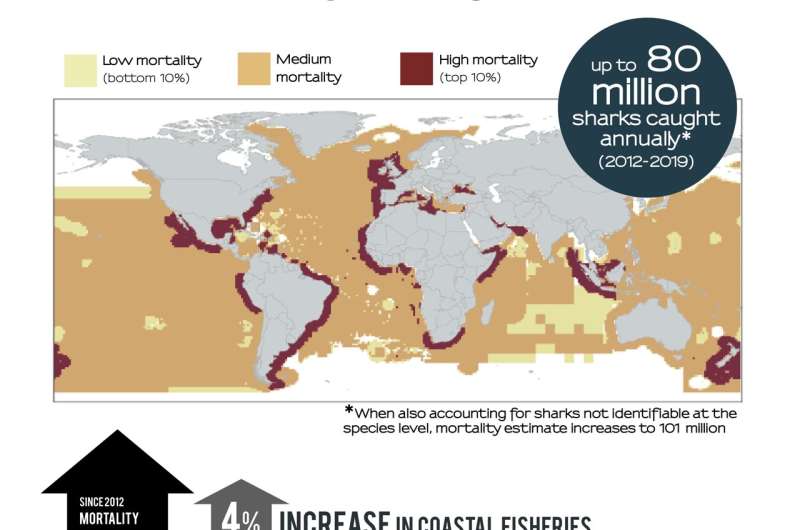This article has been reviewed according to Science X's editorial process and policies. Editors have highlighted the following attributes while ensuring the content's credibility:
fact-checked
peer-reviewed publication
trusted source
proofread
A global study reveals pathways to save threatened sharks, despite rising mortality trends

Sharks have persisted as powerful ocean predators for more than 400 million years. They survived five mass extinctions, diversifying into an amazing variety of forms and lifestyles. But this ancient lineage is now among the world's most threatened species groups due to overexploitation in poorly regulated fisheries and the proliferation of wasteful finning practices.
Governments around the world have introduced a host of regulations aimed at reducing shark catch and finning, the latter of which typically sees valuable shark fins retained for sale while carcasses are discarded at sea. But until now, there was no assessment of how effective these measures have been. A new, global assessment revealed that, while some regulations do work, overall, sharks are caught by coastal fisheries at increasing rates.
The results, published in the journal Science, are the product of an international team of researchers working to understand trends in shark mortality across 150 fishing countries and in the high seas.
They examined shark catches from 2012 to 2019—a time when many new regulations were implemented—to see whether conservation measures reduced species losses. They also conducted in-depth interviews with shark fishery experts to better contextualize current trends in shark finning and fishing practices. In all, the dataset tracked the fates of an estimated 1.1 billion sharks caught by fisheries around the world.
Led by researchers at Dalhousie University, UC Santa Barbara and The Nature Conservancy, the team came to a surprising conclusion. They found total shark fishing mortality increased from 76 million to 80 million sharks per year even though protective legislation to reduce finning increased more than 10-fold during the same time.
More than 30% of this catch was for species currently threatened with extinction. When also accounting for sharks not properly identified by species, the global mortality estimate rose to 101 million sharks in 2019.
"The unsustainable fishing of sharks is a global problem of staggering proportions that could eventually lead to the extinction of some of our planet's most ancient and revered species," said senior author Darcy Bradley, an adjunct faculty member at UC Santa Barbara and a scientist with the Nature Conservancy in California.
"We found that despite myriad regulations intended to curb shark overfishing, the total number of sharks being killed by fisheries each year is not decreasing. If anything, it's slightly increasing."
The increase came primarily from coastal shark fisheries. These activities account for 95% of total shark fishing mortality globally in terms of the number of individual sharks caught and killed. Shark mortality in these fisheries increased steadily by 4% between 2012 and 2019. This contrasted with regulated open-ocean fisheries, especially across the Atlantic and western Pacific, where shark mortality decreased by an estimated 7%.

"We show that widespread legislation designed to prevent shark finning was successful in addressing this wasteful practice but did not reduce mortality overall," said lead author Boris Worm, a research professor in the Department of Biology at Dalhousie University in Nova Scotia. "Too many sharks are still dying; this is especially worrisome for threatened species such as hammerheads."
The team also analyzed the relationship between shark catches and shark fishing regulations by country, finding that shark fishing prohibitions and accountable governance were the only measures associated with reduced mortality.
"Complete bans on shark fishing, through protective measures such as shark sanctuaries can be successful, highlighting an opportunity to prioritize these and other area-based conservation measures," explained Bradley.
Nearly 70% of maritime jurisdictions around the world have introduced some regulatory measures to eliminate shark finning and associated fishing mortality, little of which existed 20 years ago.
"The amazing thing is that it's not just one or two countries, but that all around the world, governments and some fishing companies have committed to eliminating finning, often in response to public pressure. The challenge now is to build on this momentum and get stronger measures in place to reduce shark catches overall," said co-author Laurenne Schiller, a post-doctoral fellow at Carleton University, Ottawa.
While the researchers found that finning prohibitions likely reduced shark finning at sea, these regulations had little effect on mortality overall. In fact, they may have even increased catches, possibly by incentivizing the full use of sharks and creating additional markets for shark meat and other products.
Co-author Leonardo Feitosa, a shark biologist from Brazil now working at UC Santa Barbara, explained, "We have seen the demand for shark fins decreasing and the demand for shark meat increasing, with Brazil and Italy being the main consumers. Because shark meat is a relatively cheap substitute for other types of fish, there is considerable mislabeling, making some consumers eat shark meat without their knowledge."

The authors conclude that shark fishing continues to present a substantial threat to shark populations, but that proven solutions are working where they are applied. "It's clear from our analysis that cracking down on shark finning is not enough," said Echelle Burns, a data scientist at UC Santa Barbara.
"More specific measures that address shark mortality—like prohibiting fishing in certain areas or requiring fishers to release vulnerable species that they accidentally caught—can help protect more sharks."
"Effective conservation actions for sharks are often impeded by lack of community-based awareness and stewardship projects," added co-author Nidhi D'Costa, a shark researcher from Bangladesh now working at Dalhousie. "This is especially crucial in countries where small-scale artisanal fisheries are a major driver of shark mortality."
The authors recommend combining geographic protections with fishing regulations to improve the outlook for sharks. New policies need to specifically discourage the retention of overfished and threatened species and help reduce shark bycatch. They also stress the importance of accountability of fleets, fishing companies and management bodies to support the successful implementation of these measures.
"Our analysis highlights the need for improved transparency and reporting requirements," explained Sara Orofino, a data analyst at UC Santa Barbara. "Shark catches are often self-reported, aggregated into broad groups, and crucial information on discarding practices is often lacking. Accurate, comprehensive, and accessible data are critical to effectively evaluate how well regulations are working in safeguarding sharks and other threatened species."
Maria Deng Palomares, senior scientist and project manager at the "Sea Around Us" initiative, University of British Columbia concludes, "There is a path forward to avoid a global extinction crisis for sharks, but the time to act is now."
More information: Boris Worm et al, Global shark fishing mortality still rising despite widespread regulatory change, Science (2024). DOI: 10.1126/science.adf8984. www.science.org/doi/10.1126/science.adf8984
Journal information: Science
Provided by University of California - Santa Barbara


















